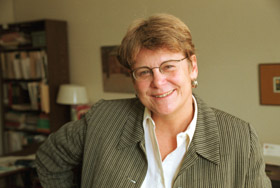
| ||
 | ||
 Professor Carol Cumming Speirs PHOTO: OWEN EGAN |
Confused? Abused? Call Carol
|
SYLVAIN-JACQUES DESJARDINS | While every conflict has a potential resolution, sometimes a student may need a helping hand to find their way out of a problem.
Fortunately, McGill provides a service where student grievances can be effectively addressed: the Office of the Ombudsperson. McGill ombudsperson Carol Cumming Speirs's job is to field complaints from students, investigate their situations and make recommendations on how to solve them. Cumming Speirs spends one full day a week as the ombudsperson; her other four weekdays are spent as an associate professor in the School of Social Work. She believes an ombudsperson can be an effective protector of students' rights. "Especially at an institution that's as decentralized as McGill," she explains, "where there are different cultures in every faculty and differences in how regulations are applied." Problems need not be monumental to prompt students to consult their ombudsperson. "The first part of my job is to provide information, the second is advice and the third is intervention," says Cumming Speirs, noting many students come to her for information that's often readily available. "They just don't know where to look for it." Created in 1987, McGill's Office of the Ombudsperson sees up to 300 students per year with a variety of queries. Cumming Speirs says one problem she repeatedly encounters involves students who want to obtain extensions to the course add-drop period. "Sometimes there are extenuating circumstances in these cases," she says, like when a professor neglects to provide a written course outline detailing their expectations. "If a student doesn't know how they will be evaluated," she asks, "should they be penalized for wanting to drop a course after the drop deadline?" The most difficult cases university ombudspersons must deal with, says Cumming Speirs, are situations where graduate students feel their research might have been appropriated by a supervising professor. But since no university will tolerate the theft of intellectual property, consulting an ombudsperson is a good way for an issue to be mediated. "I can point out the rules and regulations and (suggest potential) remedies," says Cumming Speirs. "McGill has plenty of rules and regulations that can resolve a lot of things." However, she cautions, both sides of a story must be heard before she can make any recommendations. Often, she will meet a student several times to see if their case has merit before approaching a professor about the issue. "And I can only contact a professor if a student authorizes me to do so," she says. While Cumming Speirs's job is made easier when all parties give full cooperation to an investigation, she says, her role is not confrontational or adversarial. "I try to point out all the facts and help both parties find a way to reconciliation. Her background as a marriage and family therapy clinician no doubt comes in handy on occasion. And students are often able to handle situations themselves, without her intervention. "Sometimes all students need is to be guided to the right resources or have a situation clarified," she says. "An ombudsperson lets them realize that." Cumming Speirs says her status as an academic helps her in her role as ombudsperson. Professors usually feel more comfortable when she calls to clarify a matter because she is seen as a colleague rather than as a meddling outsider. Out of the five major Quebec universities that provide an ombudsperson, McGill is the only institution where the person performing the job is also a professor. While that might lead some to believe the position is ripe for conflict of interest, Cumming Speirs says that if problems involving any of her own students or faculty colleagues were to occur, the associate dean of students has agreed to take over as ombudsperson in those cases. Another variance between McGill's ombudsperson and those of other universities is that Cumming Speirs works only part-time, while other institutions have full-time ombudspersons. "The McGill Office of the Ombudsperson is the most poorly resourced across Quebec," says Cumming Speirs, adding she would need a full-time assistant to help with investigations and to sort out which cases should be prioritized. "Unfortunately, this lack of triage system means that I sometimes can't deal with the more urgent cases quickly enough." Even if McGill's Office of the Ombudsperson doesn't have perfect working conditions, it still fulfills its critical mandate of helping students. As Cumming Speirs says, "There are always situations or people that will fall between the cracks." Carol Cumming Speirs may be reached at 398-7059.
|
|
| |||||